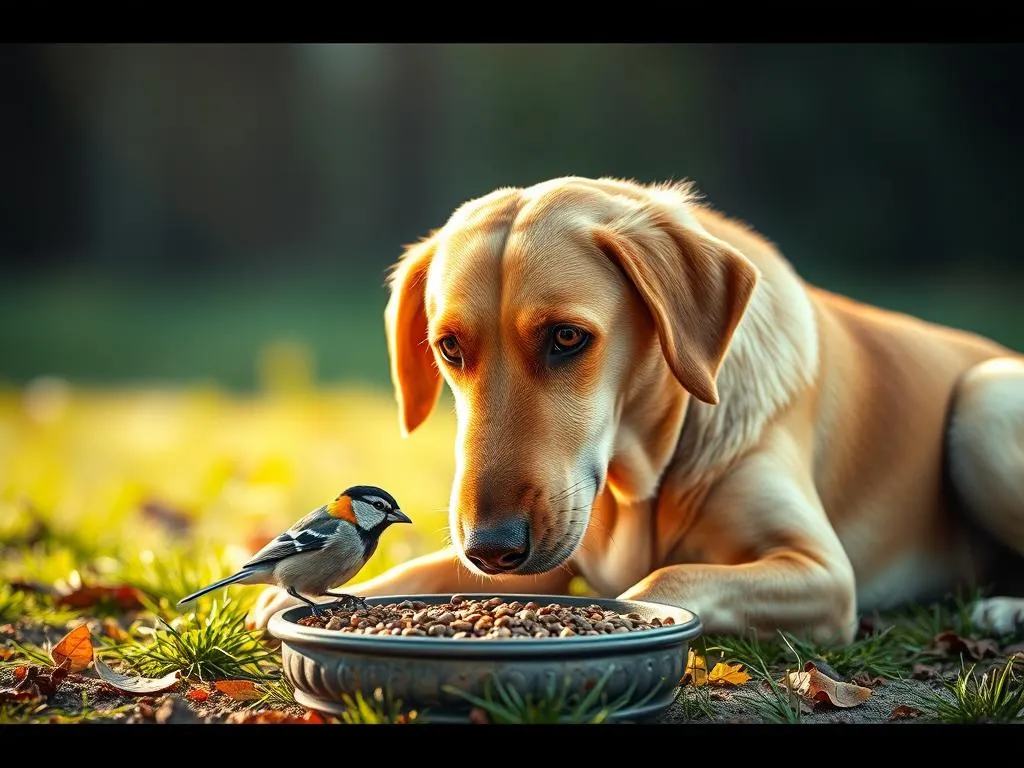
Introduction
As dog owners, we strive to provide the best care for our furry companions. However, sometimes their natural instincts can lead them to engage in behaviors that concern us—such as when a dog keeps eating birdseed. This behavior not only raises questions about our pets’ health but also creates a challenge in managing their diet. Understanding why dogs are attracted to birdseed, the potential health risks associated with this behavior, and how to prevent it is crucial for every dog owner. This article explores these aspects in detail, providing insights into managing this issue effectively.
Understanding the Behavior
Why Dogs Eat Birdseed
Dogs are naturally curious creatures, and their foraging instincts often lead them to explore various food sources. The appeal of birdseed can be attributed to several factors:
- Natural Instincts: Dogs are descendants of wild canines, who often scavenged for food. This innate behavior drives them to investigate and consume whatever they can find.
- Smell and Taste: Birdseed is often mixed with seeds, nuts, and sometimes dried fruits, which can be very enticing for dogs. The aroma and texture may attract them, making it hard to resist.
- Curiosity: Dogs are inquisitive by nature. They may stumble upon birdseed while sniffing around the yard or during outdoor activities, leading them to taste it out of sheer curiosity.
Common Scenarios
Certain situations can increase the likelihood of a dog keeping eating birdseed:
- Outdoor Activities: Dogs who spend a lot of time outdoors, especially during seasons when bird feeders are active, are more likely to encounter birdseed.
- Feeding Locations: Bird feeders placed close to the ground or in open areas are easily accessible to dogs, making it simpler for them to indulge in this behavior.
- Seasonal Factors: In winter, when birds rely heavily on feeders for food, the abundance of birdseed can attract not just avian visitors but also curious dogs.
Health Risks Associated with Eating Birdseed
Nutritional Concerns
While birdseed may seem harmless, it lacks the essential nutrients that dogs need for a balanced diet. Relying on birdseed can lead to:
- Dietary Imbalances: Since birdseed is not formulated for canine nutrition, it often lacks protein, vitamins, and other nutrients crucial for a dog’s health.
- Weight Gain: Excessive consumption of birdseed can lead to weight gain, especially if it replaces regular meals.
Toxic Ingredients
Not all birdseed is safe for dogs. Some mixes contain ingredients that can be harmful, including:
- Certain Nuts: Some nuts, like macadamia nuts, are toxic to dogs and can lead to serious health issues.
- Dried Fruits: Ingredients such as raisins and sultanas can cause kidney damage in dogs, leading to potentially life-threatening situations.
Gastrointestinal Issues
Ingesting birdseed can lead to various gastrointestinal problems, including:
- Vomiting and Diarrhea: Dogs may experience digestive upset after consuming birdseed, manifesting as vomiting or diarrhea.
- Blockages: In severe cases, larger quantities of birdseed can result in intestinal blockages, which require immediate veterinary attention.
Monitoring Your Dog’s Behavior
Observing Eating Habits
Monitoring your dog’s eating habits is essential in preventing issues related to dogs eating birdseed. Here are some tips to keep in mind:
- Keep a Close Eye: Watch your dog during outdoor activities to ensure they aren’t scavenging for birdseed.
- Use a Leash: When in areas where bird feeders are present, consider using a leash to maintain control over your dog’s movements.
Recognizing Signs of Distress
If your dog does ingest birdseed, it’s important to know the signs of distress. Symptoms to watch for include:
- Lethargy: A sudden lack of energy may indicate an underlying issue.
- Gastrointestinal Distress: Look for signs of vomiting, diarrhea, or bloating.
- Loss of Appetite: If your dog refuses to eat after consuming birdseed, it may be a sign of discomfort.
If any of these symptoms occur, it’s important to consult your veterinarian promptly.
Preventive Measures
Training Techniques
Training your dog can play a significant role in preventing them from eating birdseed. Here are some effective methods:
- Positive Reinforcement: Reward your dog for ignoring birdseed and following commands to stay away from it.
- Teach Commands: Commands such as “leave it” or “no” can help deter your dog from attempting to eat birdseed when you’re outdoors.
Environmental Management
Managing your yard can significantly reduce the chances of your dog encountering birdseed:
- Strategic Placement of Bird Feeders: Elevate bird feeders to make them less accessible to dogs. Consider placing them in areas where dogs are not allowed.
- Clean Up: Regularly clean up fallen birdseed to prevent your dog from snacking on it.
Providing Alternatives
To keep your dog satisfied and prevent them from seeking out birdseed, consider offering safe and healthy alternatives:
- Dog Treats: Provide high-quality dog treats that are specifically formulated for canine nutrition.
- Engaging Activities: Keep your dog occupied with toys, puzzles, or games that divert their attention away from birdseed.
What to Do if Your Dog Eats Birdseed
Immediate Steps
If you discover that your dog has eaten birdseed, follow these steps:
- Stay Calm: Your reaction can influence your dog’s behavior. Stay calm to assess the situation properly.
- Check the Ingredients: If possible, check the birdseed mix for any potentially toxic ingredients.
- Observe for Symptoms: Monitor your dog for any signs of distress or illness.
When to Call the Vet
Determining whether a veterinary visit is necessary depends on several factors:
- Quantity Ingested: If your dog has eaten a large amount of birdseed, especially if it contains harmful ingredients, contact your vet.
- Symptoms: If your dog shows any signs of distress, such as vomiting, diarrhea, or lethargy, seek veterinary advice immediately.
Common treatments for ingestion may include inducing vomiting, administering activated charcoal, or providing supportive care.
Long-term Health Considerations
Regular Vet Check-ups
Routine veterinary care is essential for keeping your dog healthy:
- Early Detection: Regular check-ups can help catch potential issues before they escalate.
- Nutritional Guidance: Your vet can provide advice on a balanced diet and any adjustments needed based on your dog’s lifestyle.
Healthy Diet for Dogs
A well-balanced diet is crucial for your dog’s overall health:
- High-Quality Dog Food: Invest in high-quality dog food that meets nutritional standards for your pet’s age and lifestyle.
- Limit Table Scraps: Avoid giving your dog table scraps or foods that are not specifically formulated for dogs, including birdseed.
Conclusion
It’s essential for dog owners to be aware of the behaviors that can affect their pet’s health, such as when a dog keeps eating birdseed. Understanding the reasons behind this behavior, recognizing potential health risks, and implementing preventive measures can help maintain your dog’s well-being. By monitoring their behavior and providing a balanced diet, you can ensure that your furry friend remains healthy and happy. Always be proactive in managing your dog’s environment and diet to foster their overall health.









